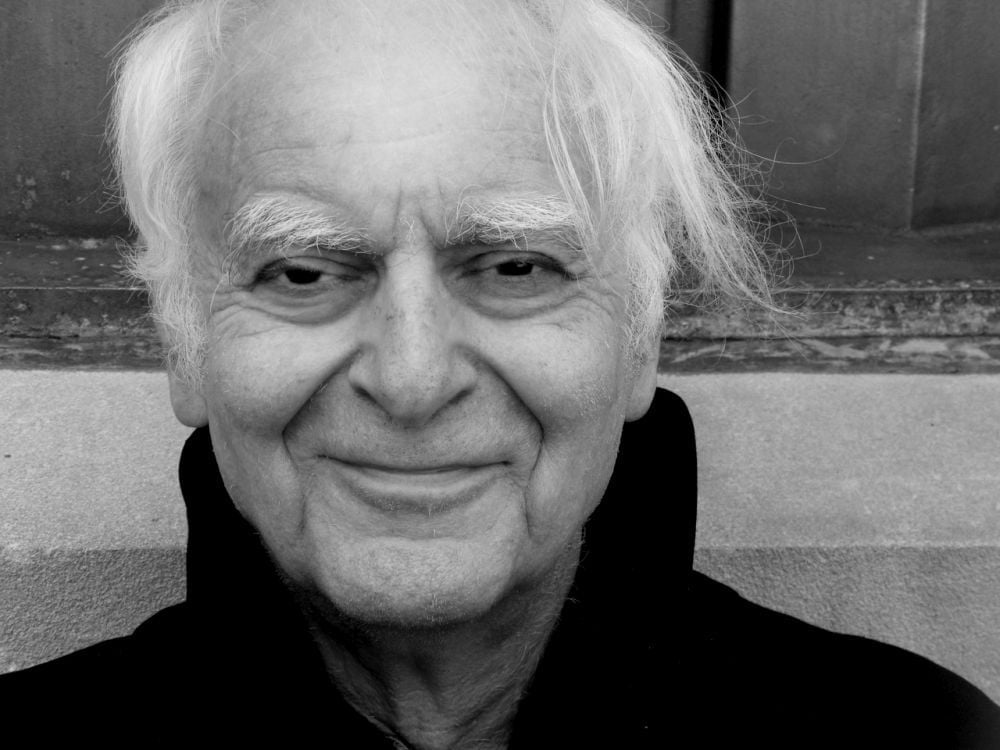
Adolf Muschg
Adolf Muschg was born in Zollikon in the canton of Zurich in 1934. He studied German, English, and psychology at the University of Zurich and in Cambridge and completed a doctorate on Ernst Barlach. Together with Peter Bichsel, Friedrich Dürrenmatt, and Max Frisch, he was one of the secessionists who founded the Olten Group in 1969 after leaving the Swiss Writers’ Union. After guest lectureships in Japan and the USA, he was Professor of German Language and Literature at the ETH Zurich between 1970 and 1999. In 1997, he became the first director of the Collegium Helveticum at the Semper Observatory.
His first novel, »Im Sommer des Hasen« (tr: In the Summer of the Rabbit), was published in 1965, which was followed by numerous stories, plays, radio plays, screenplays, and novels such as »Sutters Glück« (2001; tr: Sutter’s Luck), »Eikan, du bist spät« (2005; tr: Eikan, You’re Late), and »Kinderhochzeit« (2008; tr: Kids Wedding). His texts often tell of searchers and stumblers and explore the question of how a person might free oneself from the influences of origin, society, and family. »Der Rote Ritter. Eine Geschichte von Parzivâl« (1993; tr: The Red Knight: The Story of Parzival) is a new interpretation of the verse novel by Wolfram von Eschenbach and is considered Adolf Muschg’s main literary work. The reference to the present is established, as so often in his works, through the narrative of a historical material. Another central theme of his literary œuvre is the exploration of foreign lands, in Muschg’s case quite specifically the mysteries of Japan, which he traveled to and explored throughout his life. With his political essays »Wenn Auschwitz in der Schweiz liegt« (1997; tr: When Auschwitz is in Switzerland) and »Was ist europäisch? Reden für einen gastlichen Erdteil« (2005; tr: What is European? Speeches for a Hospitable Continent), he took a stand on Switzerland’s coming to terms with the past and its everyday politics, thus showing himself to be involved in European political discourse. His novel »Heimkehr nach Fukushima« (2018; tr: Return to Fukushima), in which he addresses the complicated relationship between Europe and Japan and the problem of nuclear energy, also bears witness to this. Most recently, he published the novel »Aberleben« (2021). The novel follows the story of a writer suffering from cancer who leaves his marriage and Switzerland at the age of seventy to write a new book in Berlin in which he gives new life to a character he let die in the previous work.
Muschg has been honoured with numerous awards, including the Hermann Hesse Prize, the Georg Büchner Prize, the Gottfried Keller Prize, the Grimmelshausen Prize, and the Grand Prix de Littérature of Switzerland for his life’s work. He is a member of the Academy of Arts in Berlin, of which he was president from 2003 to 2006, the Academy of Sciences and Literature in Mainz, and the German Academy for Language and Poetry in Darmstadt, among others. Adolf Muschg lives near Zurich.
Die Aufgeregten von Goethe
Politisches Drama in 40 Auftritten
Arche
Zürich, 1971
Albissers Grund
Suhrkamp
Frankfurt a. M., 1974
Entfernte Bekannte
Suhrkamp
Frankfurt a. M., 1976
Gottfried Keller
Kindler
München, 1977
Besuch in der Schweiz
Reclam
Stuttgart, 1978
Baiyun oder die Freundschaftsgesellschaft
Suhrkamp
Frankfurt a. M., 1980
Noch ein Wunsch
Suhrkamp
Frankfurt a. M., 1980
Gegenzauber
Suhrkamp
Frankfurt a. M., 1981
Leib und Leben
Suhrkamp
Frankfurt a. M., 1981
Im Sommer des Hasen Leib und Leben
Suhrkamp
Frankfurt a. M., 1982
Fremdkörper
Suhrkamp
Frankfurt a. M., 1983
Ausgewählte Erzählungen 1962–1982
Suhrkamp
Frankfurt a. M., 1983
Das Licht und der Schlüssel
Erziehungsroman eines Vampirs
Suhrkamp
Frankfurt a. M., 1984
Mitgespielt
Suhrkamp
Frankfurt a. M., 1984
Goethe als Emigrant
Auf der Suche nach dem Grünen bei einem alten Dichter
Suhrkamp
Frankfurt a. M., 1986
Empörung durch Landschaften
Suhrkamp
Frankfurt a. M., 1988
Der Turmhahn und andere Liebesgeschichten
Suhrkamp
Frankfurt a. M., 1989
Die Schweiz am Ende. Am Ende die Schweiz
Erinnerungen an mein Land vor 1991
Suhrkamp
Frankfurt a. M., 1990
Zeichenverschiebung
Edition Klaus Isele
Eggingen, 1991
Herr, was fehlt Euch
Zusprüche und Nachreden aus dem Sprechzimmer des heiligen Grals
Suhrkamp
Frankfurt a. M., 1994
Nur ausziehen wollte sie sich nicht
Ein erster Satz und seine Fortsetzung
Suhrkamp
Frankfurt a. M., 1995
Liebesgeschichten
Suhrkamp
Frankfurt a. M., 1995
Die Insel, die Kolumbus nicht gefunden hat
Sieben Geschichten Japans
Suhrkamp
Frankfurt a. M., 1996
Der Rote Ritter
Eine Geschichte von Parzivâl
Suhrkamp
Frankfurt a. M., 1996
Wenn Auschwitz in der Schweiz liegt
Fünf Reden eines Schweizers an seine und keine Nation
Suhrkamp
Frankfurt a. M., 1997
O mein Heimatland
150 Versuche mit dem berühmten Schweizer Echo
Suhrkamp
Frankfurt a. M., 1998
Stadt Europa
Schwabe
Basel, 1999
Sutters Glück
Suhrkamp
Frankfurt a. M., 2001
Das gefangene Lächeln
Suhrkamp
Frankfurt a. M., 2002
Gehen kann ich allein und andere Liebesgeschichten
Suhrkamp
Frankfurt a. M., 2003
Von einem der auszog, leben zu lernen
Goethes Reisen in die Schweiz
Suhrkamp
Frankfurt a. M., 2004
Der Schein trügt nicht
Über Goethe
Insel
Frankfurt a. M., 2004
Eikan, du bist spät
Suhrkamp
Frankfurt a. M., 2005
Was ist europäisch?
Reden für einen gastlichen Erdteil
C.H.Beck
München, 2005
Tragische Literaturgeschichte
Diogenes
Zürich, 2006
Kinderhochzeit
Suhrkamp
Frankfurt a. M., 2008
Sax
C.H.Beck
München, 2010
Löwenstern
C.H.Beck
München, 2012
Die Japanische Tasche
C.H.Beck
München, 2015
Heimkehr nach Fukushima
C.H.Beck
München, 2018
Aberleben
C.H.Beck
München, 2021
